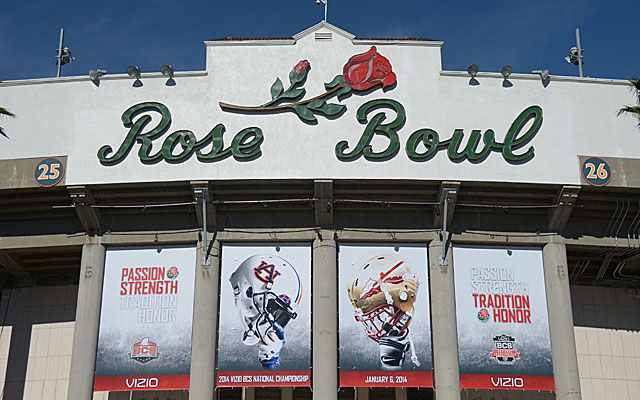
More college football: Jon Solomon | Dennis Dodd | Jeremy Fowler | Latest news
Barely three months before kickoff, the six bowls participating in the new College Football Playoff have yet to sign contracts with the organization, CBSSports.com has learned.
CFP executive director Bill Hancock confirmed over the weekend what several sources told CBSSports.com: The bowls are still in various degrees of negotiation over several subjects in what is described as an approximately 200-page document.
"We're continuing to discuss the contracts," Hancock said. "This is nothing unusual. We're just plugging away and everything will get finished."
One high-ranking playoff official said he "wished" the contracts were signed at this late date but had total confidence deals would get done. In fact, Hancock recalled a period early in the BCS when he said the final contracts were signed shortly before the games themselves were played.
"For Bill and company right now, it's got to be a little bit distracting not to have it all wrapped up," said one source intimately involved in the process. "They've got a lot on their plate."
Few involved in the situation would talk on the record because of the sensitivity of the situation. Those involved believe the deals will get done but it is a concern that the playoff is sort of suspended in mid-air at the moment.
The CFP -- basically the commissioners of the 10 Football Bowl Subdivision conferences -- sold the rights to a playoff for the next 12 years to ESPN for $6 billion-$7 billion. Now the CFP has to come to separate agreements with the Rose, Orange, Sugar, Fiesta, Cotton and Peach Bowls.
"I'm not at all concerned about it," said Big 12 commissioner Bob Bowlsby, whose league has a partnership with the Sugar Bowl. "They tend to be kind of dense documents. ... There's no negotiation going on, it's just a matter of committing it to writing."
Other sources contend there is much discussion and negotiation between the bowls and CFP in certain areas. Some of these bowls have decades-long traditions that extend beyond the playing field. If they felt like spending lavishly in a certain area, they spent lavishly. Ticket prices have become a significant discussion point, sources said.
In the CFP era, those bowl budgets will be tightly controlled. There will be more of a cookie-cutter look behind the scenes. One source described a game management that resembles a combined Final Four and Super Bowl. More sponsorships will be controlled by ESPN, which needs to get some of its money back.
"We don't have the revenue pieces we used to have," Fiesta Bowl official Duane Woods told the Arizona Republic in March. That month the bowl laid off two-thirds of its staff.
"It's a whole different landscape than in the past," Woods said.
The bulky document in possession of what is being called the New Year's Six bowls describes in detail the CFP requirements. Any push-back has come from those bowls used to their own uniqueness.
Little of it is noticed by the public but the contracts are a large part of changing to a new postseason system.
"Things that used to be done on a handshake now require 180 pages," said one source. "They've [CFP] discovered that one size does not fit all."
The so-called "contract" bowls -- Sugar, Orange, Rose -- don't have a memorandum of understanding at this point, according to a source. Such a memorandum is considered a precursor to a formal contract.
Meanwhile, the so-called "host" bowls -- those without conference ties -- have only six-year deals with the CFP. However, CBSSports.com has learned that part of the ongoing negotiation is an additional six-year option. Also being discussed, a possible three-year "look-in" for the CFP during the first six years. That re-opening of the deal would be used evaluate the business model of those three bowls, according to a source.
There is at least the concern on the part of one host bowl that the look-in could be used to evaluate those three bowls' viability in the system beyond the first six years.
The six-year deal for the host bowls shouldn't be construed as chance for the playoff to go to eight teams in mid-stream said a person with intimate knowledge of the CFP. ESPN CEO Jon Skipper and Hancock told reporters 18 months ago that the playoff would remain at four teams for the length of the deal. Since then, commissioners and CFP officials have repeated the same mantra.
"Is there the potential to go to eight or more?" said one person closely aligned with the CFP bowls. "We've been vehemently told no by everybody. ... All of them have said it's 12 years. That's what the presidents want. That's what the commissioners want."
Bowl executives who were used to partnering with conferences now find themselves contractors in the process. In the CFP era, major conferences have basically leveraged their teams and brand, selling their "product" back to those bowls.
While the BCS may have been more of an uncertainty at the beginning, the playoff is an indication of the burgeoning popularity of the game. You're either in or you're out of the CFP. That status defines cities and bowls.
The Orange, Sugar and Rose bowls are veterans of the BCS the past 16 years. They have conference ties that allow them scheduling certainty in the CFP. In years when they do not pass through the system as national semifinals, the three bowls are contracted with various conferences.
Most are familiar with the traditional matchup with the Rose (Pac-12-Big Ten). The Sugar now has a similar deal with the SEC and Big 12. The ACC champion goes to the Orange Bowl against the highest ranked of a group that includes teams from the SEC, Big Ten and Notre Dame.
The Peach (Atlanta) and Cotton (Arlington, Texas) are new to the system. The Fiesta is also a BCS veteran. The three have no conference affiliations. One of those bowls will take the automatic qualifier (highest-ranked) from the 60 teams in the Group of Five conferences -- MAC, Sun Belt, Conference USA, American, Mountain West -- if that team is not involved in the playoff.
The entire rotation of the first three years of the CFP can be seen here.




















